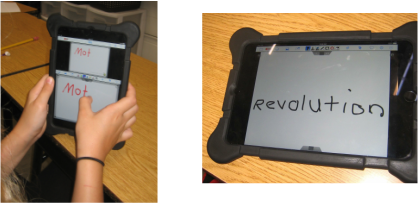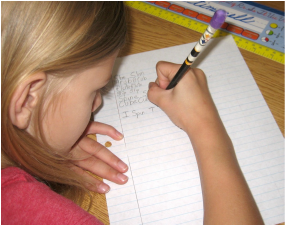|
Like the Look-Touch-Say activity I discussed in September, Word Dictation and Sentence Dictation are activities that give students opportunities to listen to known and unknown words, apply strategies to spell them, analyze mistakes, and notice the sounds, patterns, and meanings of words. These activities can be done whole group, small group, or with a buddy, and the means of writing the words can vary: old school paper and pencil, individual white boards, or digital tablets. Word Dictation Finding words for dictation is easy if you create a master spelling list that includes many words that follow a few sounds, patterns, or meaning parts. Keep the dictation session brief, maybe six or seven minutes long, and allow a little time for discussion during the instant error correction phase. Here’s an example of what this activity looks and sounds like when I teach it to students who have white boards for writing.
When dictating unknown words, I use a little chant to reinforce the idea that words follow patterns and a strategy for spelling is to use a known word to spell an unknown word (spelling by analogy). The chant is simply, “If you can spell ___, you can spell ___.” Thus, when I ask children to spell the word bruise, I might say, “The next word is bruise. If you can spell cruise, you can bruise.” Likewise, “The next spelling word is bruising. If you can spell cruising, you can spell bruising.” Sentence Dictation In sentence dictation, students write a sentence that’s completely decodable based on what they’ve previously learned in spelling. I began using this activity in heterogeneously grouped classrooms after I had done it for a year with my Wilson Reading intervention groups. I think it’s an effective activity for two reasons. First, it gives kids the opportunity to apply spelling strategies across a string of words. Second, it asks children to listen closely to entire sentences and then remember what was said. I think you’ll agree that listening and remembering is a skill many children (and adults, too) need to practice! In April and May of last year, I taught spelling for three weeks in a second grade classroom. One of the weeks focused on two long vowel sounds: long I spelled i_e and long U spelled u_e. To help the students understand how adding a letter e to a CVC word can create a long vowel sound, I took the class through a sentence dictation activity. The words in each sentence came from my spelling master list, not from their take-home list. Because the students had never heard the words before, they had to apply sound and pattern knowledge to spell them, which is the point of using “unstudied” words. I started the sentence dictation by saying, “I say a sentence, we say the sentence together, you say the sentence, and then you write the sentence. I say, we say, you say, you write! Get ready, here’s the sentence: I spin the slim flute. Say it with me: I spin the slim flute. Now you say it.” Every student said the sentence – I could see every mouth moving – but I still wasn’t sure they were all saying the right words. So I repeated the sentence more time and had them repeat it. Next, after saying, “You write it,” I walked through the class and monitored their progress. As students wrote, I noticed some of them pausing to repeat the sentence under their breaths. I also noticed that almost all of the children were spelling the words correctly. Good for them! Sentence dictation can take many forms. It can be a regular part of your spelling instruction or it can be done once or twice a month. You can have children write with paper and pencil, with white board and marker, or with computer tables and a writing program. You can incorporate the activity into your weekly spelling test. I used to do it as an opportunity to earn a bonus point. Any student who spelled the entire dictated sentence correctly and included correct capitalization and punctuation received a bonus point, which offset any misspelled test word.
If you feel the need to find sentences, programs such Recipe for Reading, Wilson Language, and Step By Step Learning, have them. Sentences can be made more memorable if they are goofy, and Step By Step Learning has word cards called Silly Sentence Cards. But I think you can make your own sentences. To create a sentence or two doesn’t take much time, and with a little extra effort you can create ones that are amusing to elementary-age kids. Here are sentences using long U words from the master list I created in my upcoming spelling book for Stenhouse Publishing: June was rude when she threw a cashew. When he sat on a juice box, my nephew bruised his butt. But why shoulder the burden of writing sentences? Put the work on the shoulders of the kids! Challenge your students to craft silly sentences from their list of spelling words and submit them to you. Then look them over, reject any with incorrect mechanics, put the rest in a pile, and randomly draw two. Read these to the class during sentence dictation or for a spelling test bonus point. The children who are picked will be thrilled. |
Mark WeaklandI am a teacher, literacy consultant, author, musician, nature lover, and life long learner.
|


 RSS Feed
RSS Feed